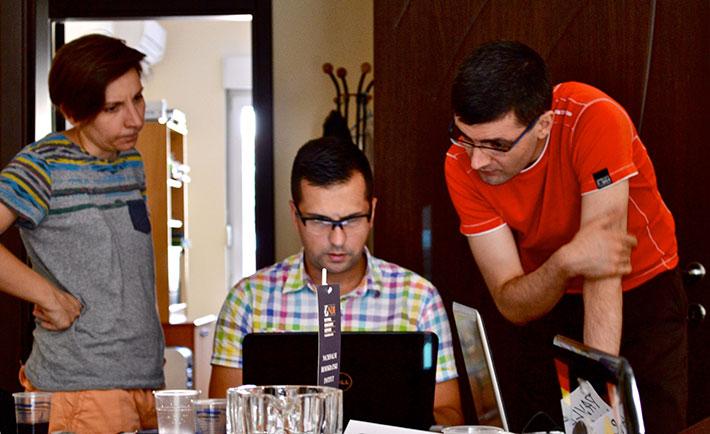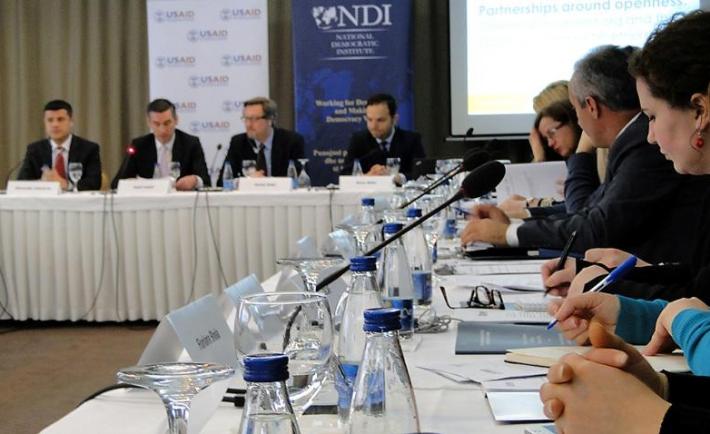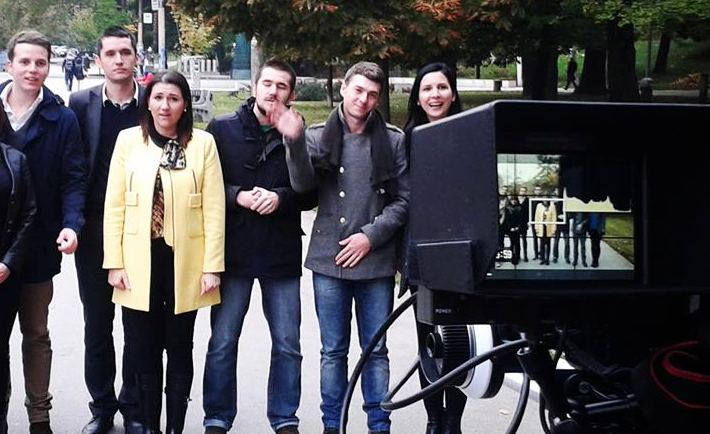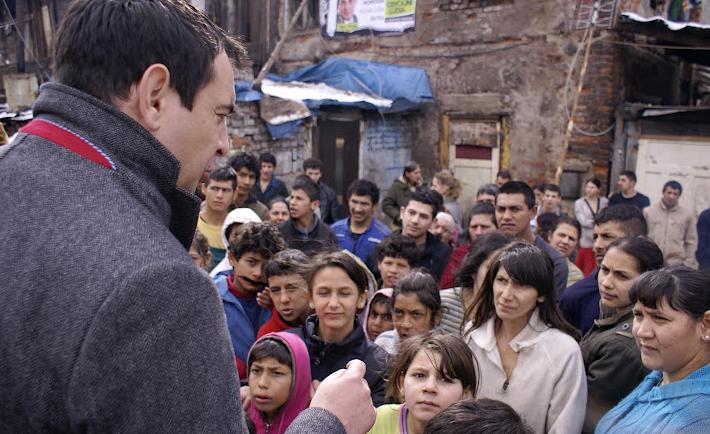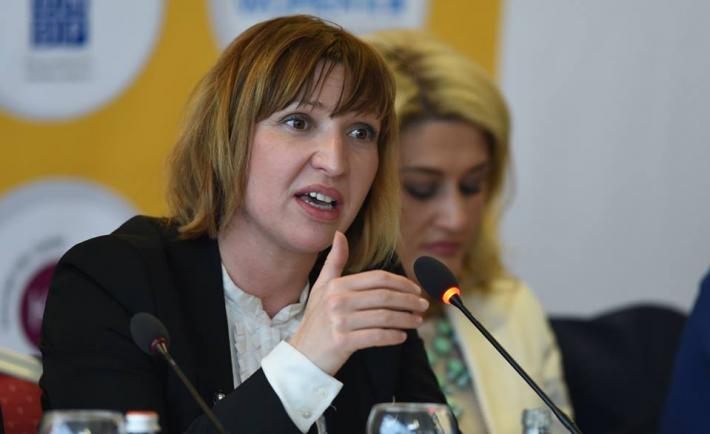At a local Belgrade bar in September 2015, a group of assailants attacked a young LGBTI activist named Dragoslava Barzut while she was spending the evening with friends. No one stood up to protect Barzut and her friends that night. She continued to receive threats following the attack. Despite the attack and threats, asylum abroad was not an option for Barzut. She will not leave her country as long as she can be an agent for change even though she feels wary while on public transportation and nervous during her daily commute to work. “I'm not staying here because Serbia is an ideal place for someone like me to live,” she said, “but I deeply believe that if I don’t leave, one day it may be. My fight is here.”
Being LGBTI in Serbia: Can you walk out your door and be proud of who you are?
Women Use Budgets to Promote Gender Equality in Eurasia
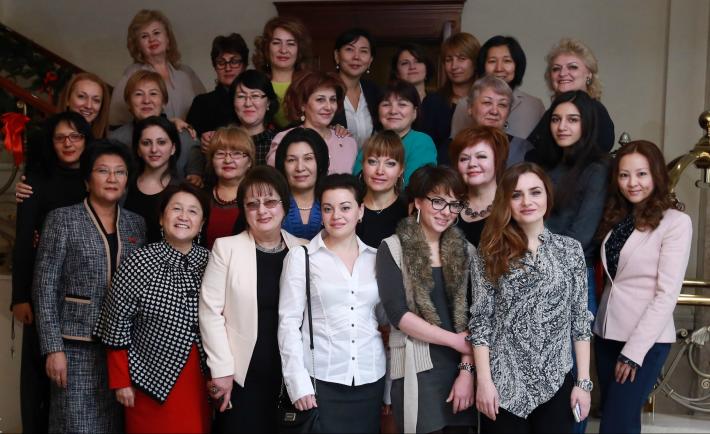
Armenian, Kazakh, and Kyrgyz women activists gathered to learn about holding governments accountable for the impact of laws and policies on women in particular.
This December, women activists from Armenia, Kazakhstan and Kyrgyzstan came together for a four-day gender responsive budgeting (GRB) workshop sponsored by NDI to begin wrestling with this problem. More than 30 participants gathered in Bishkek, Kyrgyzstan to discuss the theory and practice of GRB, and to jointly develop GRB programs for implementation in their own countries.
Conflict Transformers: How theater is helping heal ethnic tensions 16 years after war in Kosovo
_2.jpg)
An interethnic group of actors trained by NDI in conflict transformation shares war stories from audience members at a Playback Theater performance in Prizren, Kosovo. Credit: Arta Qorri
A young Kosovar Serbian actress sinks to her knees and, stricken with grief, expresses her longing for an uncle who is still “missing” 16 years after Kosovo’s ethnic conflict ended in 1999. The Kosovar Albanian man sitting to her left on stage watches mesmerized. It is his story that the actress is telling, and though he is unable to understand her words, spoken in Serbian, he tells the audience after the performance that she has captured the essence of his grief and pain. Through theater, the actors are retelling the history of violence between ethnic Albanians and Serbs in Kosovo in a new way that encourages empathy and healing. At the end of the evening, which is full of audience stories re-enacted, another audience member stands up and asks the interethnic theater group in front of her, “Where have you been for the last 16 years?”
Whence Popularity? The New Wave of European Populist Parties
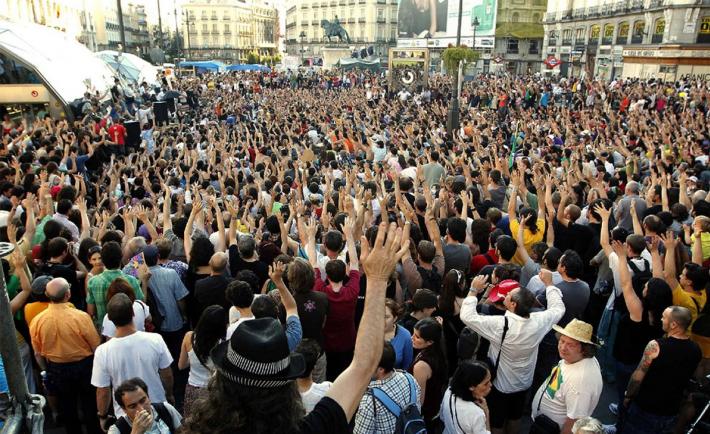
Protesters gather in Madrid’s Puerta del Sol square as part of the 15-M anti-austerity movement. Source: Wikimedia Commons
A populist wave has crashed down upon the streets of Europe. Populist parties, old and new, left and right, have been dominating headlines in Europe over the past few years. Such parties are often led by charismatic leaders, and they claim to represent the will of the people against the elite or status quo. “The people” they appeal to are often those who feel alienated by European integration -- those who feel threatened by economic reform or lenient immigration policies.
Protest Parties: What Does a Pirate or Anarcho-Surrealist Do After Being Elected?

Jon Gnarr, in his official capacity as mayor of Reykjavik, Iceland. Gnarr, a sketch comedian, was elected in 2009 on satirical platform of providing free towels at public pools, a polar bear at the zoo and a drug-free parliament by 2020.
In the last decade, a proliferation of anti-establishment parties in the Euro-Atlantic region has led to increased numbers of protest candidates elected to local, national and European office. Protest parties reject mainstream politics and incumbency, opting instead for sensational campaigns that often advocate for a single issue. Pirates in the UK or anarcho-surrealists in Iceland make for interesting debates, but what happens when candidates who reject a system become part of it? Recent examples show that citizens will vote for protest candidates to highlight “elephant-in-the-room” issues, but in the long run candidates need to be able to deliver on critical issues to maintain support.
Kosovo Assembly Endorses the Declaration on Parliamentary Openness
The Declaration on Parliamentary Openness is a call to the world’s parliaments to increase their commitment to citizen engagement in legislative work. Collaboratively drafted by the global parliamentary monitoring community, the declaration has been endorsed by more than 180 civil society organizations (CSOs) in over 80 countries. Increasingly, parliaments are also signing on to the declaration. On May 4, the Assembly of the Republic of Kosovo formally endorsed the declaration, joining a small vanguard of parliaments around the world.
The Floor is Yours: Bosnia's New Online Citizen Engagement Platform
NDItech, NDI’s Technology Programs team, sat down via Google Hangouts with NDI’s Asja Kratovic, resident program officer in Bosnia-Herzegovina (BiH), to discuss the recently released Imate Rijec website. The site brings together the voices of politicians and citizens on some of Bosnia’s most pressing social and political issues.
New Politics in Bosnia-Herzegovina?
Bosnia-Herzegovina’s journey from the Dayton Peace Accords to sustainable democracy has rested on the notion that ethnic power-sharing and highly decentralized government would, over time, give way to more integrated forms of government and politics. Ethnic interests, though still primary, would cease to be the exclusive basis on which power is won and exercised. Other forms of association – environmental, business, labor, students and pensioners, etc. – transcending ethnicity would take their place in the political system.
Partnering with Roma Activists to Evaluate Political Mainstreaming in Slovakia
In two days the world will celebrate International Roma Day, which highlights the issues facing Romani people around the world.
Over the last decade, with funding from the National Endowment for Democracy (NED), NDI has supported Roma political candidates, civic activists and elected officials as they seek to increase their participation in civic and political life.
Women Leaders Unite in Kosovo for Week of Women
More than 100 Kosovar women from all sectors of society traveled to Pristina last week for the fourth annual Week of Women (WoW). The weeklong event, supported by NDI, brings together Kosovar women to hone skills and techniques to help them become more effective leaders in their fields.

